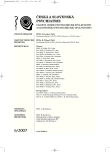Repetitive Transcranial Magnetic Stimulation (rTMS), Depressive Disorder and Cognitive Functions (A Review)
Repetitivní transkraniální magnetická stimulace (rTMS), depresivní porucha a kognitivní funkce
Depresivní porucha je spojena s určitým typem kognitivního deficitu. Kognitivní deficit u deprese je charakterizován zejména narušenou pamětí, pozorností, deficitem exekutivních funkcí a sníženou slovní plynulostí.
Repetitivní transkraniální magnetická stimulace (rTMS) je neinvazivní technika a ukazuje se jako potencionálně vhodný nástroj pro léčbu depresivní poruchy v jejích nejrůznějších podobách. Přesto však je potřeba zdokonalit naše znalosti o optimálních parametrech aplikace rTMS a časovém rámci pro udržení léčby. Kromě toho trvání zisků z aplikace rTMS a efektivita a bezpečnost udržovací terapie jsou stále ještě do značné míry neprozkoumány.
Tato práce podává komplexní přehled dostupných informací z odborné literatury, ze které vyplývá, že rTMS lze považovat za bezpečnou metodu léčby depresivní poruchy, ale možnost uplatnění rTMS v ovlivnění jednotlivých parametrů kognitivních funkcí stále ještě představuje do značné míry neprobádanou oblast a žádá si další výzkumy.
Klíčová slova:
depresivní porucha, kognitivní funkce, neuropsychologie, repetitivní transkraniální magnetická stimulace (rTMS).
Authors:
H. Kučerová; R. Přikryl; M. Krejčířová
Authors‘ workplace:
Psychiatrická klinika LF MU a FN Brno
přednostka prof. MUDr. E. Češková, CSc.
Published in:
Čes. a slov. Psychiat., 103, 2007, No. 6, pp. 285-290.
Category:
Comprehensive Reports
Overview
Depression is associated with a certain kind of cognitive deficit. Cognitive deficit in depression is characterized especially by impaired memory, impaired attention, executive functions deficit and diminished verbal fluency.
Repetitive transcranial magnetic stimulation (rTMS) is a noninvasive brain technique and turns out as a pottentionally suitable tool for treatment of depression in all sorts of this disorder. In spite of that is necessary to improve our knowledge about optimal parametres of rTMS application and its time frame for maintenance of treatment.
On the top of this, continuation of rTMS effect and safeness of sequel therapy are not explored very well. This study pointed to that comprehensive review of reasonable professional literature, which shows that rTMS is a safe method for treatment of depression, but possibilities in use rTMS in influencing of some characteristics of cognitive functionar is still not very well known and it is important to execute more research work.
Key words:
depression, cognitive function, neuropsychology, repetitive transcranial magnetic stimulation (rTMS).
Labels
Addictology Paediatric psychiatry PsychiatryArticle was published in
Czech and Slovak Psychiatry

2007 Issue 6
- Memantine in Dementia Therapy – Current Findings and Possible Future Applications
- Memantine Eases Daily Life for Patients and Caregivers
- Hope Awakens with Early Diagnosis of Parkinson's Disease Based on Skin Odor
- Deep stimulation of the globus pallidus improved clinical symptoms in a patient with refractory parkinsonism and genetic mutation
-
All articles in this issue
- A Psychosocial Need Inquiry in Young Acute Psychotic Patients (A Pilot Study)
- Pharmacotherapy of Anorexia Nervosa
- Repetitive Transcranial Magnetic Stimulation (rTMS), Depressive Disorder and Cognitive Functions (A Review)
- Night Eating Syndrome
- Central Pontine Myelinolysis in Female Patient with Anorexia Nervosa
- Czech and Slovak Psychiatry
- Journal archive
- Current issue
- About the journal
Most read in this issue
- Central Pontine Myelinolysis in Female Patient with Anorexia Nervosa
- Repetitive Transcranial Magnetic Stimulation (rTMS), Depressive Disorder and Cognitive Functions (A Review)
- Night Eating Syndrome
- Pharmacotherapy of Anorexia Nervosa
